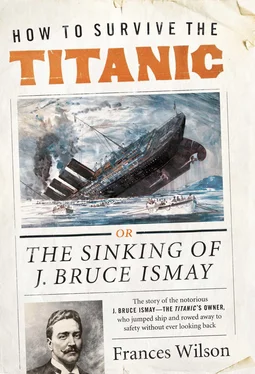Marian Thayer’s appeal is disarming. She has a belief system, she is searching for a deeper truth; her interests are in fate, the spirit world, alternative medicine; she is intense and odd and immediate. She sanctifies human relations; she describes her conversation with Major Butt as though it were the beginnings of an affair, she writes a letter of condolence as though it were a love letter. She speaks to everyone in the same way. Her genius lies in the realisation that Taft responded to the Titanic not as an international catastrophe but as a personal loss. ‘I cannot turn around in my room,’ he wept at Butt’s memorial service; ‘I can’t go anywhere without expecting to see his smiling face or hear his cheerful voice in greeting.’ While the former President, Theodore Roosevelt, who had also been close to Butt, was sending his ‘deepest sympathy to the kinsfolk of those who have perished’, Taft was thinking of the death of one man only: ‘Archie was the soul of honour. He was wholehearted and wholesome; courteous and courageous and a charming companion.’ While others thought Taft’s self-involved grief inappropriate at a time when he was required to steer his own ship through rocky waters, Marian Thayer opened her arms to him. ‘Never had I come in such contact immediately with anyone,’ she told Taft of her encounter with the Major. ‘He felt the same and we both marvelled at the time at the strangeness of such a thing…’ But there was a quality of strangeness to all her relationships, particularly the one she shared with Ismay.
It seems likely that while they were on the Titanic, Mrs Thayer came into ‘contact immediately’ with Ismay in the same way she had done with Major Butt. Ismay, who was not used to having ‘contact’ with anyone — apprehension was the response he more usually generated in people — interpreted their easy communication as a mutual attraction. She flattered him with her attention as she probably flattered other men; women were raised to reflect men at twice their size, and in response Ismay felt unusually relaxed and open. Conrad noted in Victory that forty-five is the ‘age of recklessness for many men’; in the American edition of the novel he increases it to fifty. During his time on the Titanic, Ismay experienced the recklessness that comes from supreme self-confidence and sudden, unexpected joy. His ship was the future; he was enjoying the attention of a beautiful female passenger. Having tried to get out of being present on the voyage, he was now in no hurry to get to New York. Finding time alone with Marian Thayer, who was constantly chaperoned, was impossible but when they met in company, whether in the dining room or on the deck, they never turned from each other. He looked for reasons to detain her, and when he saw her on the promenade deck with Emily Ryerson on the afternoon of Sunday 14 April, he had the perfect excuse: he showed her the message from the Baltic. While Mrs Ryerson told the story to the press, Mrs Thayer said nothing about the encounter herself. When the time came for Mrs Ryerson to sign her affidavit, it may have been Marian Thayer who persuaded her to withhold Ismay’s comments about lighting further boilers to get through the ice. The poor man was going through enough already.
Mrs Thayer phoned Ismay to say goodbye before he left New York on 5 May, and he sent a message to her from the pilot boat as he was leaving on the Adriatic. A letter from Mrs Thayer was then waiting for him when he boarded the ship which, he said, he ‘read every night’. Her letter eclipsed the one from Florence, which he received several days earlier: there is nothing more repellent than a love letter from a person you no longer love. Marian Thayer had lost her husband but her son, Jack, who had also gone down with the ship, had been miraculously saved by clinging on to the same upturned lifeboat as Lightoller. She at least had something to be thankful for and, unlike the other widows in first-class, harboured no ill will towards Ismay. Instead, she gravitated further towards him. Such was Mrs Thayer’s sympathy for Ismay that while the other widows on the Carpathia were spreading rumours about his culpability, Jack went to see him in his cabin. ‘I have never seen a man so completely wrecked,’ he recalled twenty-eight years later. 3Jack Thayer’s description, which he must have taken straight to Marian, suggests that he saw Ismay not as his father’s killer but as his mother’s friend. To Mrs Thayer, Ismay was neither a villain nor a coward but someone who was grieving, as was she. Her sympathy was a cause of irritation to the other widows on the Carpathia, particularly Eleanor Widener, whose dead husband’s father was on the board of the IMM, and who had not liked Ismay sufficiently to invite him to their dinner party. ‘Better a thousand times a dead John B. Thayer than a living Ismay,’ Mrs Widener announced when she heard that the president of the IMM was alive. Her remark was a reminder to Marian Thayer not to let a soft heart besmirch the memory of a heroic husband.
In the letter to Ismay which she sent to the Adriatic, Mrs Thayer said that she wished she too had died that night, that death would be better than living like this, and she asked him not to forget her. 4She enclosed a page cut from her calendar which carried some words which had given her comfort and which she hoped would comfort him as well. Ismay replied from the ship that he ‘repeated the words regularly’ and that he would keep them on his dressing table. ‘Ever since leaving America,’ he continued, ‘you have been in my thoughts and I have talked to you so much. How I wish you had been here as I am sure we could have helped one another to bear our grief and loss. For you, poor dear, my heart bleeds and I cannot convey to you in words all I feel. I ask myself often why it is you seem so much to me. Can you answer?’
His crossing on the Adriatic, he told her, has so far been ‘wonderful’. While he stayed in his room for the first few days, he now started going onto the deck twice a day for a short time. ‘I hate seeing anyone I do not know, as I cannot feel I have done anything wrong and cannot blame myself for the disaster. Still, the feeling is there. I can only hope time will make things easier.’ Ismay had confided to other people his sense of blamelessness. In the letter written to the brother of Frank Millet on 25 April, he had also expressed his belief that ‘I am not in any way responsible for the truly dreadful disaster’. The death of Mrs Thayer’s husband, Ismay now tells her, had nothing to do with him; it was an act of God. But still, he says, ‘the feeling is there’. The feeling of responsibility has attached itself to his skin like an irritating tick which, with luck, he will be able to flick away. ‘Forgive me for inflicting on you such a long letter,’ he ends. ‘Goodbye, my friend.’
There are few people less equipped than Ismay for a journey into the human heart but in Mrs Thayer, it seems, he has found his Marlow: ‘I would like somebody to understand — somebody — one person at least!’ Jim reveals in the Malabar Hotel, ‘You! Why not you!’ Ismay has never known the comforts of fellowship, but Marian Thayer talks intensively to many people. She is surrounded by family and friends and she spends her days writing to those who share her sense of the meaninglessness of living on after such a catastrophe; she writes to the President, she writes to Ismay, she writes to the other American first-class wives who lost their husbands, many of whom are friends of hers, some of whom are neighbours. She will stay in touch with Captain Rostron for the next ten years. Virginia Woolf believed that ‘there should be threads floating in the air, which would merely have to be taken hold of, in order to talk. You would walk about the world like a spider in the middle of a web.’ Mrs Thayer worked her own loom of human relations. In this, as in other things, she flowed in the current of the age.
Читать дальше












